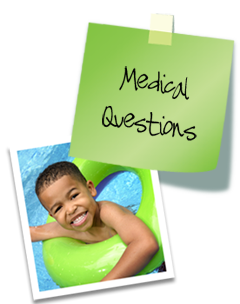Diarrhea
Not unlike vomiting, diarrhea is a common childhood ailment. It is defined as a sudden increase in the number and/or looseness of stools. It is most often caused by a virus that affects the gastrointestinal system and may be preceded by a day or two of vomiting. Diarrhea due to this can last for several days—often a week (and sometimes even longer). Occasionally diarrhea can be caused by parasites or bacteria but tends to be more persistent (>2 weeks) or associated with bloody diarrhea (See the section “Call our office if…). Antibiotics can also cause diarrhea (See the section below entitled “If your child is on an antibiotic”
How to help your child
When a child has diarrhea our goals are to maintain hydration and to protect the skin of the diaper area (if in diapers) from becoming too irritated and inflamed so he will not become uncomfortable. Diarrhea due to non-worrisome causes, in itself, is generally painless--- unless a diaper rash occurs.
Giving your child enough fluids is the most important initial aspect of treatment. Water (in children > 6 months) and oral rehydration solutions are acceptable. Avoid all fruit juices and other very sugary fluids like Gatorade and soft drinks. They can make diarrhea worse. However, encourage your child to take some solid food. A diet consisting of only fluids can lead to continued and worsened diarrhea often coined as “starvation stools”. The solid foods to encourage are those that may actually help “thicken” stools. Examples of these are white bread, white toast, crackers, rice, pasta, applesauce and bananas. If reluctant at first, be patient and continue to offer solids frequently. Do not force feed your child.
Avoid greasy or fried foods.
Milk in the diet is controversial. We used to tell all our patients to avoid milk and milk products as it was thought to worsen diarrhea. However, more recent research has not necessarily proven this to be true. Some children certainly do seem particularly sensitive to milk when they are suffering from diarrhea—but certainly not all children. Monitor your child and see if he or she seems to have more trouble when they take dairy. If they do, you may hold off on them for awhile. This intolerance is temporary. You may return your child to dairy as tolerated. If your infant is formula fed with a cow’s milk based formula (Enfamil or Similac) and they seem completely intolerant to their formula you could consider a temporary switch to a lactose-free formula until he/she is better.
If your baby is breastfed—continue to breastfeed. However, you will need to feed more frequently than usual to keep up with the fluid demands.
If your child is in diapers…
Severe diaper rash, in addition to diarrhea is a concern because it can make a child very uncomfortable. Be sure to change diapers very frequently—as soon as your child has a bowel movement or urinates. Use a thick layer of a barrier diaper cream---preferably one with zinc oxide. Avoid the use of diaper wipes. Even if they say they are “good for rashes” they still can further irritate sensitized skin. Either use a soft, gentle washcloth with water or rinse out the disposable diaper wipe first under the faucet before using it. Although often difficult with a child with diarrhea, try and allow your child to air-dry their bottom for awhile. This too, will help prevent a diaper rash or cure one that is already present.
If your child is on an antibiotic…
A common side effect of antibiotics is diarrhea. Most diarrhea caused by antibiotics is mild and generally is not severe enough to cause dehydration. Certain antibiotics can cause more prominent diarrhea and diaper rashes. Once again, this is a side effect and not an allergic reaction. Once the antibiotic is finished, stools return to normal in a few days. Try and treat through mild diarrhea. Do avoid fruit juices, soda and other sugary fluids as they can make diarrhea worse. If in diapers, take care to change your child frequently, to avoid the use of diaper wipes and to air-dry his/her bottom as able to help prevent a diaper rash.
Other important information
Be sure to wash your hands well after changing any diapers. Infectious diarrhea tends to be very contagious.
Remember, Pedialyte does not cure diarrhea. It is an oral rehydrating solution and is for temporary use. Encourage solid foods as discussed above (as long as your child is not also vomiting). If your child is also vomiting, refer to the vomiting section of this website.
Over the counter antidiarrheal medicines are generally not recommended. Pepto Bismol should never be used in children less than 12 years of age as it contains aspirin which is associated with Reye’s syndrome – a potentially life threatening illness.
Call Our Office Immediately if…
Your child is manifesting signs of dehydration (no urine in more than 8 hrs, very dry on the inside of his/her mouth or no tears when he/she cries)
Your child has blood in the diarrhea
Your child has had more than eight episodes of diarrhea in eight hours
Your child is less than 3 months old and has a fever >100.4 R
Your child is acting very ill (difficult to awaken or acts confused when awake) or is very weak
Call us during regular office hours if…
Your child has had diarrhea lasting more than 2 weeks
Your child has had a fever >100.4 for more than three days
Your child has a severe diaper rash that is not responding to the measures discussed above
Your child is on an antibiotic and you want to stop it
You have other concerns or questions
